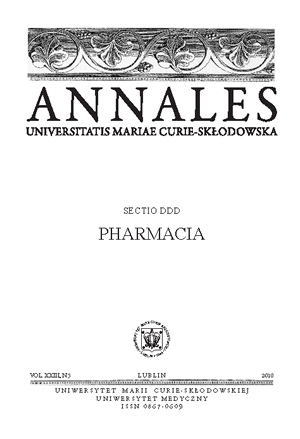Effect of maleimide derivative on oxidative stress and glutathione antioxidant system in 1,2-dimethylhydrazine induced colon carcinogenesis in rat
Keywords:
maleimide derivative, 1,2-dimethylhydrasine, colon cancer, oxidative stressAbstract
The levels of protein carbonyl groups, thiobarbituric acid reactive substances (TBARS), reduced glutathione, and glutathione-dependent enzymes, and c-kit expression in intestinal mucosa of rats after treatment with maleimide derivative 1-(4-Cl-benzyl)-3-Cl-4-(CF3-phenylamino)-1H-pyrrol-2.5-dione (MI-1) in doses 0.027 and 2.7 mg/kg have been studied. Colon cancer was induced by 1,2-dimethylhydrazine (DMH). The increase of the level of TBARS and protein carbonyl groups and glutathione antioxidant system in DMH-treated rats was shown. MI-1 restores changes of the studied parameters and blocks c-kit expression in intestinal mucosa of DMH-treated rats.
References
1. Attoub S. et al.: The c-kit tyrosine kinase inhibitor ST1571 for colorectal cancer therapy. Cancer Res., 62, 4879, 2002.
2. Chadha V. D. et al.: Zinc mediated normalization of histoarchitecture and antioxidant status offers protection against initiation of experimental carcinogenesis. Mol. Cell Biochem., 304, 101, 2007.
3. Czeczot H. et al.: Glutathione and GSH-dependent enzymes in patients with liver cirrhosis and hepatocellular carcinoma. Acta Biochim. Polonica, 53, 237, 2006.
4. Dubinina G. G. et al.: Antiproliferative action of the new derivatives of 1-(4-R-benzyl)-3-R1-4-(R2-phenylamino)-1H-pyrrol-2,5-dione. Zh. Org. Farm. Chim., 5, 39, 2007.
5. Dubinina G.G. et al.: In Silico design of protein kinase inhibitors: successes and failures. Anti-Cancer Agents in Med. Chem., 7, 171, 2007.
6. Filinska O. et al.: The lipid peroxidation and the antioxidant system of the rat liver during 1,2-dimethylhidrazine-induced carcinogenesis. The Ukr. Biochem. J., 81, 196, 2009.
7. Levine R.L. et al.: Method in enzymology, 186, 464, 1990.
8. Manju V. et al.: Rat colonic lipid peroxidation and antioxidant status: the effect of dietary luteolin on 1,2-dimethylhydrazine challenge. Cellular and Molec. Biology Letters, 10, 535, 2005.
9. Karpischenko A.I.: Medicynskie laboratornye tehnologii. Spravochnik. Sankt-Petersburg 2002.
10. Skrzydlewska E. et al.: Lipid peroxidation and ontioxidant status in colorectal cancer. World J. Gastroen., 11, 403, 2005.
Downloads
Published
Issue
Section
License
Copyright (c) 2010 Authors

This work is licensed under a Creative Commons Attribution-NonCommercial-NoDerivatives 3.0 Unported License.


